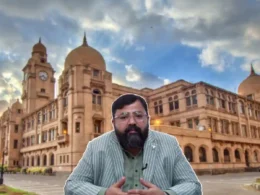President WWF-Pakistan, Nadeem Khalid issued a stark warning about the growing threat of water scarcity in Karachi, citing city’s main water resources such as Keenjhar Lake, Hub Dam and underground aquifers, are under severe threat.
Speaking at the third workshop of the Collective Action Platform for Initiating the Policy Level Work and Strategic Planning for Resilience and Sustainability of Freshwater Ecosystems at a local hotel on Wednesday, Khalid said that these water bodies are not just the sources of supply to Karachi, but are lifelines supporting people, farms and ecosystems.
The workshop highlighted the challenges confronting freshwater resources and proposed nature-based solutions for water conservation that may help improve nature and support people and enhance businesses.
The event brought together a diverse group of participants, including water experts, government officials, industry representatives, and community leaders, to discuss collaborative efforts and innovative solutions addressing the freshwater challenges in Pakistan.
Speaking on the occasion, Dr. Masood Arshad, Senior Director Programme, WWF-Pakistan, provided an overview of WWF’s programmatic functions.
He emphasised the urgency of Pakistan’s water crisis and noted that urban centres such as Karachi and Lahore were grappling with severe water scarcity, pollution and poor management. Karachi faces a shortage of water due to a rapid increase in population and industrial activities.
These factors, coupled with poor management of freshwater resources and climate change, have aggravated the water situation in the city.
Dr. Arshad further emphasized that unsustainable groundwater abstraction is contributing to the degradation of critical ecosystems, particularly in the Indus Delta, Keenjhar Lake, and Ravi River.
He underscored the importance of nature-positive approaches that safeguard and restore freshwater ecosystems while delivering tangible benefits for biodiversity and local communities.
“We must act decisively to integrate ecosystem-based solutions into our water governance frameworks,” he noted.
Sohail Ali Naqvi, Director Freshwater Programme, WWF-Pakistan, mentioned that “Water scarcity is no longer a distant challenge, it is a present reality that requires collective and coordinated action.”
He emphasised the need for nature-based solutions (NbS) as an integrated approach to address water-related challenges while delivering co-benefits for climate change mitigation, biodiversity conservation, and community resilience.
WWF-Pakistan, through multi-stakeholder collaboration, is advancing such solutions to ensure sustainable water management beyond conventional approaches.
He highlighted the recently launched initiative “Building Water-Sensitive Societies: Collaborative Solutions for Freshwater Resilience and Sustainability,” five-year project is supported by GSK, a global bio-pharma company.
This project is designed to promote systemic change in way urban areas manage, protect, and restore their freshwater resources water governance with key focus on Karachi, Keenjhar Lake, and Indus Delta in Sindh and Lahore in Punjab.
Key interventions include NbS, flood protection bunds, early warning systems, constructed wetlands, wastewater treatment plants, mosque-based ablution water reuse systems, and alternative livelihoods.
During the event, a few of these intervention models were displayed for the audience.
He also acknowledged partners like GSK and Reckitt for advancing responsible water use beyond operational boundaries under global frameworks such as the Alliance for Water Stewardship.
Speakers at the workshop urged that addressing the water issue in urban centers and critical ecosystems needs robust planning, partnerships, and collective actions that should involve government institutions, relevant NGOs, industries, and local communities.
They urged that through better management and efficient water use, water quality and availability could be improved in cities.











